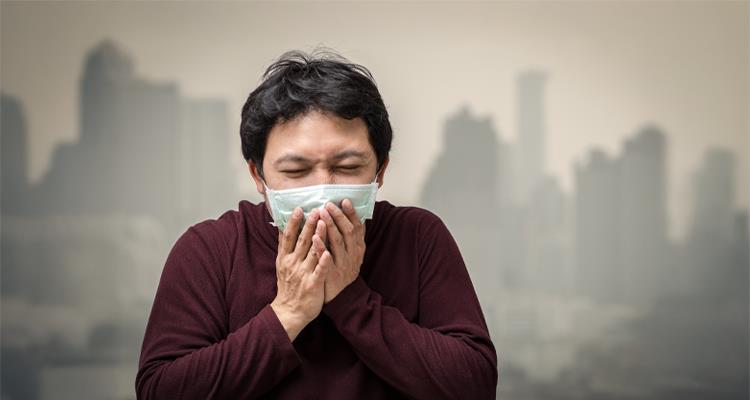How Air Pollution Causes Disease: The Hidden Impact on Your Health
2025-11-12 / RG STONE HOSPITAL / Indian Health Care System

Every breath we take should nourish our bodies with life-giving oxygen. Unfortunately, in today's world, each inhalation can also introduce a dangerous cocktail of pollutants that silently damage our health. At RG Hospitals, we've witnessed a concerning rise in pollution-related health conditions, making it crucial to understand how air pollution causes disease and what we can do to protect ourselves.
Understanding Air Pollution: The Invisible Threat
Air pollution consists of harmful substances suspended in the atmosphere, including particulate matter (PM2.5 and PM10), nitrogen dioxide, sulfur dioxide, carbon monoxide, ozone, and volatile organic compounds. These pollutants come from vehicle emissions, industrial activities, construction dust, crop burning, and household cooking fuels. While some pollution is visible as smog or haze, the most dangerous particles are often invisible to the naked eye, making them particularly insidious.
How Pollutants Enter and Attack Your Body
When you breathe polluted air, harmful particles and gases enter your respiratory system. The smallest particles, known as PM2.5 (particles smaller than 2.5 micrometers), are especially dangerous because they can penetrate deep into your lungs and even enter your bloodstream. Once inside your body, these pollutants trigger a cascade of harmful biological responses.
Inflammation and Oxidative Stress: Air pollutants cause inflammation throughout your body and generate oxidative stress—an imbalance between harmful free radicals and protective antioxidants. This oxidative damage affects cells, proteins, and DNA, laying the groundwork for various diseases.
Systemic Circulation: Once pollutants enter your bloodstream, they travel throughout your entire body, affecting organs far beyond your lungs. This explains why air pollution doesn't just cause respiratory problems but impacts cardiovascular, neurological, and other body systems.
The Disease Burden: What Air Pollution Does to Your Body
Respiratory Diseases: The most obvious impact is on your lungs. Air pollution aggravates asthma, causes chronic obstructive pulmonary disease (COPD), increases susceptibility to respiratory infections, and can even cause lung cancer. At RG Hospitals, we've seen significant increases in asthma cases, particularly among children, correlating with high pollution days.
Cardiovascular Disease: Perhaps surprisingly, air pollution is a major risk factor for heart disease and stroke. Pollutants cause blood vessels to constrict, increase blood pressure, promote blood clot formation, and damage the inner lining of arteries. Long-term exposure significantly increases the risk of heart attacks, irregular heartbeats, and heart failure.
Cancer: Long-term exposure to air pollution, particularly diesel exhaust and particulate matter, is classified as carcinogenic by the World Health Organization. Beyond lung cancer, studies link air pollution to bladder, breast, and other cancers.
Neurological Effects: Emerging research reveals alarming connections between air pollution and brain health. Pollutants can cross the blood-brain barrier, potentially contributing to cognitive decline, dementia, Alzheimer's disease, and even affecting children's brain development and academic performance.
Diabetes and Metabolic Disorders: Air pollution interferes with insulin regulation and glucose metabolism, increasing the risk of developing type 2 diabetes. It also contributes to obesity by promoting inflammation and affecting metabolic processes.
Pregnancy Complications: Pregnant women exposed to high pollution levels face increased risks of premature birth, low birth weight babies, and developmental problems in their children.
The Vulnerable Populations
While air pollution affects everyone, certain groups are particularly vulnerable:
-
Children: Their developing lungs and immune systems make them especially susceptible to pollution's harmful effects.
-
Elderly individuals: Age-related decline in organ function increases vulnerability.
-
People with pre-existing conditions: Those with asthma, heart disease, or diabetes face amplified risks.
-
Outdoor workers: Extended exposure puts them at higher risk.
-
Low-income communities: Often living near pollution sources with limited access to healthcare.
Protecting Yourself: Practical Steps
At RG Hospitals, we believe knowledge empowers action. Here's how you can protect your health:
Monitor Air Quality: Use air quality apps to check pollution levels daily and limit outdoor activities during high-pollution periods.
Indoor Air Quality: Use air purifiers with HEPA filters, keep windows closed during peak pollution hours, and ensure proper ventilation when cooking.
Wear Protection: On heavily polluted days, consider wearing N95 masks when outdoors.
Lifestyle Modifications: Exercise indoors during high-pollution days, stay hydrated to help your body eliminate toxins, and consume antioxidant-rich foods.
Reduce Your Contribution: Use public transportation, maintain your vehicle properly, avoid burning waste, and support clean energy initiatives.
Conclusion
Air pollution is not just an environmental issue—it's a critical public health crisis causing millions of preventable diseases and deaths worldwide. Understanding how pollutants damage our bodies is the first step toward protecting ourselves and advocating for cleaner air.
At RG Hospitals, we're committed to treating pollution-related health conditions and educating our community about prevention. If you're experiencing respiratory symptoms, cardiovascular concerns, or other health issues potentially linked to air pollution, don't hesitate to consult our experienced medical team. Your health is precious, and every breath matters.
Categories
Hernia Repair
Appendicitis
Piles
Urological Treatment
Hernia treatment
Enlarged Prostate (BPH)
Gall Bladder Stone
Urinary / Kidney Stone
Vitamins
Indian Health Care System
Exercise
Obesity
Female Urinary Incontinence
Single Incision Laparoscopic Surgery (SILS)
Kidney Cancer
Bladder Cancer
Ovarian cancer
Nephrology
Bariatric Surgery
Kidney Function Test
Female Urology
Radiation Therapy
Alcoholic Fatty Liver
Liver disease
Gastroenterology
Kidney Disease
Nutrition & Health
Lung Cancer

